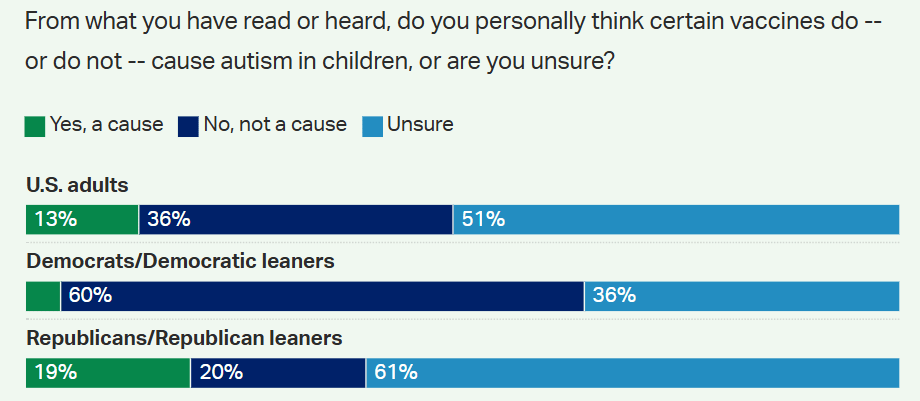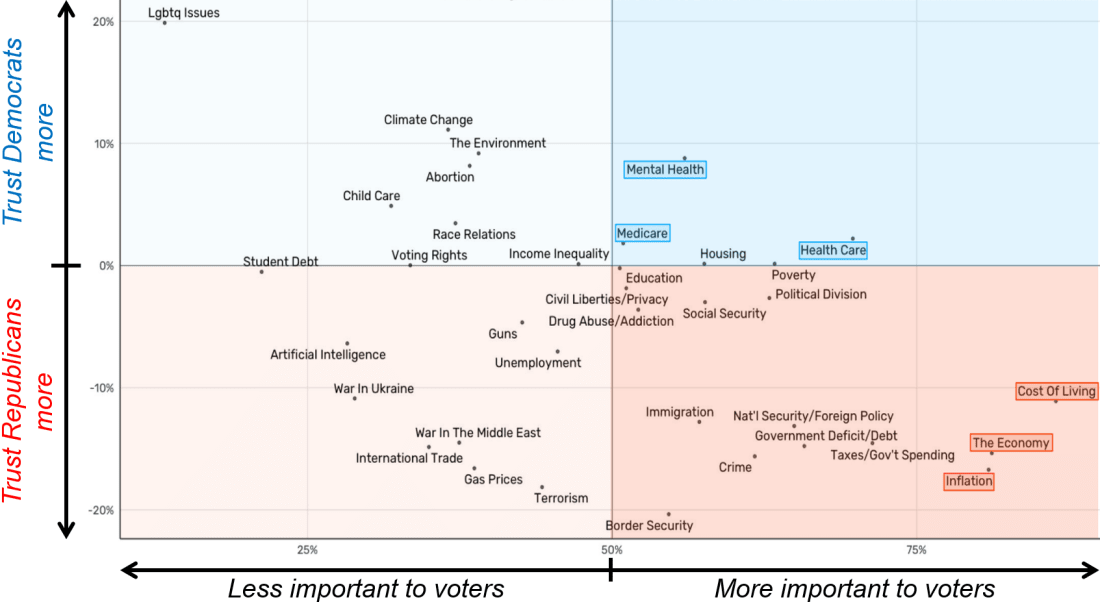|
How Democrats can win (Part 2)
Voters continue to trust Democrats on health care. But health care means a lot more than just insurance coverage.
One of the many weird things about American politics is that our government periodically shuts down, which isn’t something that happens anywhere else in the world.¹
But that’s happening right now, and the who’s-to-blame messaging war between Democrats and Republicans is afoot. Republicans are blaming Democrats for being obstructionist, and Democrats are blaming Republicans for stripping health care from Americans.
We’re still more than a year away from the ’26 midterm elections; I don’t think the politics of this particular shutdown will be relevant by then,² and I don’t think my commentary on the shutdown itself is all that interesting.
What is notable: health care is a winning issue for Democrats, and that goes far beyond protecting Medicare and keeping insurance premiums low. That’s where Democrats have an opportunity.
Article summary:
Health care is an issue where voters are already inclined to trust Democrats—and there aren’t all that many issues where that’s the case.
Republicans are doing more than just slashing health insurance. Trump’s policy changes to everything from research grants to managing pregnancy are harmful.
Democrats should expand the debate around health care: make it an issue about fighting pediatric cancers and finding cures for dementia. Those are winning issues!
Voters actually trust Democrats on health care
Trump is not especially popular, as I noted two weeks ago. The problem is that Democrats are also unpopular, more so than they’ve been in decades.
But when it comes to health care, it’s a different story. Among the issues most important to voters (on the right half of the chart below), every single issue where voters trust Democrats more than Republicans relates to health care and public health.³
Across the board, Democrats have a lot of work to do.⁴ But it’s nice when you already come to an issue with an advantage, and that’s clearly the case on health care.
“Health care” should go beyond just insurance premiums and coverage
When we discuss health care in this country, it usually involves things like Medicaid coverage, health insurance premiums, medical debt, etc.
I’ll say two things on that. First, because of the recent One Big Beautiful Bill Act, these are real issues:
Over the next decade, the number of uninsured Americans will increase by 7.8 million to 10 million people, including 160,000 more uninsured people in Missouri.
Out-of-pocket⁵ health insurance premiums will double for many Americans who get their coverage through the ACA exchange. That will hit Republican districts harder than Democratic ones.
“Uncompensated care,” defined as services that don’t get reimbursed, will increase by about $200 billion over the next decade. Medical practices and hospital systems will have to cover more of those expenses, which in practice leads to worse patient care and reduced access to medical treatments.
To state the obvious, all of this is bad.
My second point: it’s already the marquee issue of this latest government shutdown. Lots of people are already talking about this, and I don’t have much to add.
But what the Trump administration is saying and doing on the topic of health care goes way beyond just insurance coverage.
They’re making Americans less healthy, less safe, and less comfortable. All of this should be called out aggressively; Americans are against what Trump is doing here.
We’re cutting research for cancer and dementia
Not long after the election last year, I wrote about one of the greatest public health accomplishments in the last quarter century: the reduction in deaths from cancer.
There are a lot of reasons why the death rate from cancer is declining, but one of them: the U.S. federal government has collaborated closely with universities for decades.
People speak abstractly about how universities have partnered with the federal government, so I think it’s important to call out specifically the sorts of discoveries that have saved and improved lives in the U.S. (and around the world).⁶
The Human Genome Project, which involved research at universities across the U.S., unlocked an entirely new field of medicine called genomics that’s used for all sorts of novel, highly effective medical treatments.
Immunotherapy, now common in treating lots of cancers, came out of research that began at universities. mRNA vaccines, including the COVID vaccine that saved millions of lives, are possible because of university-led research too.
All sorts of different medications and treatments—everything from Keytruda (a cancer treatment) to Ozempic to Viagra⁷—came out of the research partnership between the federal government and universities.⁸
And all of this is—or was, anyway—ongoing: research on everything from cancer to autoimmune diseases to neurodegenerative diseases.
But a lot of this funding is now being threatened, partially because of DOGE and partially because of the Trump administration’s war against American universities.
I wouldn’t suggest that Democrats pick the fight to stand up for universities, per se: the approval rating for higher education is pretty low, especially among Republicans.
But you know what Americans don’t want? A federal government that cuts research grants used to find treatments for pediatric brain tumors, diabetes, and infectious diseases, or that find ways to support people with dementia or children with autism.
Unfortunately, all of that is happening.
Democrats should go after Republicans on this issue, especially when there’s still so much—like why cancers for people under 50 are fast increasing—that’s alarming and remains unanswered.
“Tough it out” and the diminishment of pain and discomfort
I know, nothing controversial that Trump says ever seems to stick. But I really thought this one might:

Here’s the transcript of what he said (emphasis added):
Tylenol during pregnancy can be associated with a very increased risk of autism. So taking Tylenol is, uh, not good. Alright, I’ll say it: it’s not good. For this reason, they are strongly recommending that women limit Tylenol use during pregnancy unless medically necessary. That’s, for instance, in cases of extremely high fever that you feel you can’t tough it out, you can’t do it. I guess there’s that. It’s a small number of cases, I think. But if you can’t tough it out, if you can’t do it, that’s what you’re going to have to do. You’ll take a Tylenol, but it’ll be very sparingly.
I’m not going to weigh in on the (blatantly wrong) scientific assertions here. I’ll leave it to the American College of Obstetricians and Gynecologists or Cleveland Clinic or the Harvard Medical School to tell you that it’s safe.⁹
What I’ll focus on instead: pregnancy is hard. 70%-80% of women experience nausea during pregnancy and 70% experience back pain. Heartburn, insomnia, and anxiety are also extremely common.¹⁰
So to be dismissive of pain, or to say that pregnancy just requires “toughening it out,” is insane—and a political opportunity.
I’ve written lots about how Democrats can win back men, but young women are an issue for Democrats too. They moved to the right in ’24, albeit not by nearly as much as men did.
Abortion is generally a good issue for Democrats, but it’s also fraught, charged, and intensely political. Here’s a chance to talk to women of all stripes—pro- and anti-abortion—about being supportive of parents, parenthood, and pregnancy.
Using the miracle of modern science to make pregnancy more comfortable and safe should be a nonpartisan issue. Federal policies are heading the other way: they’re conspiratorial, they’re wrong, and they’ll lead to needless pain and suffering.
Vaccines
And speaking of absolute quackery coming out of the federal administration, let’s touch on vaccine policy. I’ve written about this a bunch already:
I won’t rehash all of this, but here’s what I will say: even as support for vaccines moves the wrong way, lots of Americans remain undecided and persuadable:
 |
It’s extremely unsettling how many people are undecided on this issue, but it’s why we have to go on offense here—not only because it’s the right thing to do, but because there’s political opportunity too.¹¹
Measles outbreaks like the one in West Texas are, after all, totally preventable. But the Trump administration doesn’t care to take the basic steps that we know work.
Broadening a winning issue
I do think calling out Republican policies that increase insurance costs and reduce coverage is the right leading message for Democrats—it’s very easy to point the finger at Republicans on those issues.
But the opportunity doesn’t end there. What the Trump administration is doing is unempathetic, demonstrably bad for public health, and out of touch with what Americans want. It’s time to be more forceful in calling all of that out—and making Republican candidates around the country take stances on these issues too.
Feel free to share this post with someone who will find this interesting. If you’re reading this email because someone sent it to you, please consider subscribing.
That’s why, amidst this latest shutdown, 1.5 million government employees—everyone from customer support for Social Security to National Park rangers—aren’t getting paid.
If it’s still relevant in a year, then we better brace ourselves for a very long shutdown.
Health care is the third-strongest issue for Democrats, behind only LGBTQ issues and the environment. There’s a bit of nuance in how that’s defined, so let’s dig into exactly what that means for a moment.
Here’s how that poll is worded exactly: “Which party do you think does a better job handling” and then lists a bunch of issues. So when I say “strongest,” I don’t mean that in the sense that it necessarily has the power to persuade people, but rather that when pointedly asked about these policies, voters are more inclined to trust Democrats than Republicans.
If you’re curious, the three worst issues (i.e., where voters trust Republicans most vs. Democrats) are 1) crime, 2) the Israeli-Palestinian conflict, and 3) immigration.
On the three issues voters care about most—“cost of living,” “the economy,” and “inflation”—they trust Republicans much more than Democrats.
Note that this data is about eight months old now, so I would imagine there have been some shifts here—especially on inflation, where I think Trump will start to get hit harder.
Fun fact: “out-of-pocket” means something totally different to Gen Z than it does to the rest of us.
If you go back even further in time, the list of achievements is incredible. Until the late ’40s, we didn’t really understand that high blood pressure and high cholesterol led to cardiovascular disease and premature death. University research changed that.
Not ascertainable data: how many Congressmen (and I’m using “men” correctly in this instance) support slashing research funding but are themselves beneficiaries of the research that led to Viagra. I suspect it’s not zero!
The lives improved and saved by this funding are immeasurable. If you need any external validation: 174 people whose research has been supported by the National Institutes of Health have won Nobel Prizes.
It’s not the main thrust of the argument, but it’s an important one: these research dollars have historically brought some of the best and brightest from around the world to research and teach at our universities. A lot of those people will likely end up moving elsewhere in the world now.
Tylenol isn’t just safe: it can be critical, in fact, for pregnant women with fevers.
I suspect “pregnancy is hard” is not something that needs citing for women who’ve actually been pregnant. But I want to put the data out there anyway, so the ignorant out there (for instance, me) can understand how hard it is.
Lots of people who elected Trump to be tough on immigration or fight inflation aren’t enthused by what Bobby Kennedy, Jr. is up to.
If I had to guess—and it is just that—his approval rating will continue to decline as Americans get to know him better. The more he’s in the public eye, the easier it is to see that he’s nuts.


